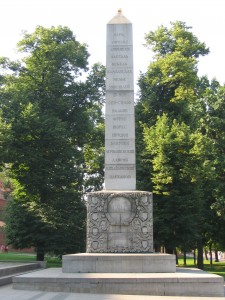Petri and Obey Urge More Involvement — and More Problem-Solving — in Politics
One is spicy and one is mild, but two formerly-influential members of the United States Congress were united in serving the same flavor messages Wednesday at Marquette Law School:
Young people should step up to get involved in politics and the political system needs to function in ways that serve the broad needs of the country.
David Obey is a Democrat who represented northern Wisconsin for 42 years and Thomas Petri is a Republican who represented central Wisconsin for 35 years before each retired. Each held major committee chairmanships that put them at the center of momentous decisions.
The two have joined in making appearances around Wisconsin in what they call “a civic dialogue tour” encouraging engagement in politics, and that brought them to an “On the Issues with Mike Gousha” program at Eckstein Hall.

 Next year is the quincentennial of the publication of Thomas More’s Utopia, and celebrations of the book and its author have already begun. More, of course, is a darling of Western culture and politics. He was canonized and is considered the patron saint of politicians and statesmen. Essayist C.K. Chesterton said that More may be “the greatest historical character in English history.”
Next year is the quincentennial of the publication of Thomas More’s Utopia, and celebrations of the book and its author have already begun. More, of course, is a darling of Western culture and politics. He was canonized and is considered the patron saint of politicians and statesmen. Essayist C.K. Chesterton said that More may be “the greatest historical character in English history.”